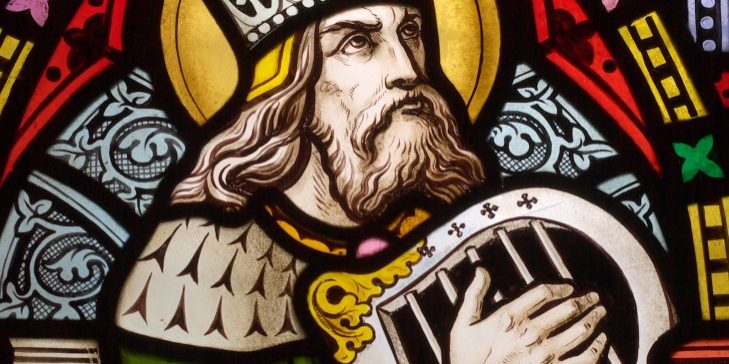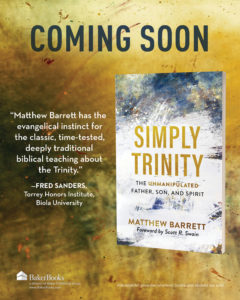
Reading the Psalms Theologically: Part One
T he book of Psalms is one of the most treasured and read books in the Bible. Historically, most churches have sung the psalms each week, and many still do. Individual psalms, like Psalm 23, are known to many in Western culture even if they lack a rudimentary understanding of the Christian faith. Given the popularity of this book for both Christians and non-Christians alike, it might seem a bit silly to write about how to read the psalms. Despite, though, the book’s popularity and the general awareness of particular psalms, many readers get tripped up by any number of questions. These include:
he book of Psalms is one of the most treasured and read books in the Bible. Historically, most churches have sung the psalms each week, and many still do. Individual psalms, like Psalm 23, are known to many in Western culture even if they lack a rudimentary understanding of the Christian faith. Given the popularity of this book for both Christians and non-Christians alike, it might seem a bit silly to write about how to read the psalms. Despite, though, the book’s popularity and the general awareness of particular psalms, many readers get tripped up by any number of questions. These include:
- Which psalms are about Jesus and which aren’t?
- What am I supposed to do with the psalms that pray for an enemy’s destruction?
- Should I just skip psalms that have nothing to do with me, like the one about Solomon’s marriage (Psalm 45)?
In other words, while it’s pretty easy to love “the psalms” in general and even specific psalms in particular (like Psalm 23), as we read through the Psalter “cover to cover” it gets a bit more difficult to understand how to read this beloved book. But there are at least two truths about the book of Psalms that help us read it well, both devotionally and theologically. First, the Psalter is a book centered on the Son. Second, the Psalter is the church’s prayer book.
In this first post, I wish to address both of these, the first through what is referred to today as “prosopological exegesis” and the second in more general terms. In the second post, I will dive further into the Christological character of the Psalms through exploring its canonical shape.
The Psalter is a Book Centered on the Son.
The first truth we need to grasp in order to understand the psalms is that this book is about God the Son incarnate Click To Tweet The first truth we need to grasp in order to understand the psalms is that this book is about God the Son incarnate. We know this already, at least generally speaking, because Jesus tells us that we should read the Bible Christocentrically (eg. Luke 16:31; Luke 24:27, 44; John 5:46; cf. also e.g. 2 Tim. 3:14–15). Because the Bible is the Spirit-inspired, inerrant Word of God, it necessarily testifies to God the Word, the Son, who is the image of the Father both eternally as his Only Begotten and in his incarnation as the Word made flesh. To put it simply, we know God by looking at Jesus, to whom the Spirit testifies (John 14–17). So of course the Psalter speaks of Jesus – the whole Bible does!
But beyond this more general affirmation of the Bible’s Christocentric content, the book of Psalms actually tells us how to read it, and specifically how to read it as a book about Israel’s Messiah. It does this in a few different ways, namely its canonical shape and its Christological character. In this initial post, I will focus on the latter.
Christological Character and Trinitarian Taxis
One way that the church has read the Psalms Christologically is through a practice called “prosopological exegesis.” The Greek word prosopon means “person,” and so prosopological exegesis simply seeks to identify the person(s) speaking in any given passage of Scripture. In the Psalms in particular, this involves identifying which verses are spoken, so to speak, by God the Son, which by God the Father, which by God the Spirit, and which simply by YHWH without any kind of personal distinction.
Of course, we need to be careful here, as the task of prosopological exegesis requires the same kinds of guardrails as does the theological task of appropriation. The doctrine of appropriations assigns, or appropriates, particularly divine actions to individual persons of the Trinity, but it does so in full recognition of the doctrine of inseparable operations – that is, that all acts of the Holy Trinity are undivided, carried out by the one God who exists as Father, Son, and Spirit. So even when we say things like, “God the Father creates,” we do not mean by that phrase that God the Father works alone in this particular divine act while the Son and Spirit sit on the sidelines. Rather, it is appropriate to appropriate the act of creation to the Father given 1) biblical language about this particular act and 2) the order, or taxis, of the Trinitarian relations (from the Father, through the Son, by the Spirit).
Christological Character and Prosopological Exegesis
Something similar occurs in prosopological exegesis, as this exercise of identifying the “voices” of each Trinitarian person is not meant to imply that there are three separate consciousnesses, voices, or wills in the Godhead. Rather, given the doctrine of accommodation, we understand that God revealing himself in human language to fallen, finite creatures means that he uses terms, imagery, analogies, and figures of speech that perfectly and inerrantly communicate truth about himself while also not exhausting or univocally describing the divine nature. With respect to the different “voices” of the divine persons, then, it is important for us to recognize that the distinction between them is real in the sense that there really are three different persons, but it is only a formal distinction with respect to three different voices since the one God only has one will, one mind, and, therefore, one voice.
The doctrine of appropriations assigns, or appropriates, particularly divine actions to individual persons of the Trinity, but it does so in full recognition of the doctrine of inseparable operations Click To Tweet That caveat about the divine unity and accommodating language in place, we can positively say that prosopological exegesis helps us read the Psalms Christologically by identifying when God the Son is speaking. Further it helps us identify when God the Son is speaking, that is, prior to the incarnation or during it. And with respect to the latter, it helps us identify whether God the Son incarnate, Jesus Christ, is speaking according to his humanity or according to his divinity (a practice known as partitive exegesis).
An example of this kind of exercise can be found by reading Psalm 110:1 – “The LORD says to my Lord, ‘Sit at my right hand, until I make your enemies your footstool.’” Who is David’s Lord whom the LORD appoints to rule with him? This is exactly the kind of question Jesus asks in Matt. 22:44–45, when he stumps the Pharisees using what we are calling here “prosopological exegesis.”
Who is speaking in Ps. 110:1? Yahweh. And to whom, asks Jesus, is Yahweh speaking? It cannot be David’s son, since David calls this person, “Lord.” And if he is not David’s son, then whose son is he? The implied answer is obvious – he must be Yahweh’s Son. We could multiply this example, reading through each Psalm and identifying the various speakers. In some cases, like this one, the Son is being spoken to, while in others, like Psalm 22, he is the one speaking. In any case, propsopological exegesis helps us read the Psalms theologically by reading them Christologically.
The Psalter is a Prayer Book for the Church.
The Psalter is about Jesus, but this also means it’s about Jesus’ Body and Bride, the Church. If Psalms 1–3 (and with Psalm 3, Psalm 4 as well) are about the Wise Victorious King who Suffers for his People, then Psalms 5 and 6 remind us that this King’s People, his Body and Bride, need God, through the work of his Kingly Son, to give us victory over our Enemy and to forgive us our sins. Apart from him we are all enemies. In Psalms 5 and 6, we hear the voice of God the Son incarnate, that same wise king of Psalms 1 and 2, taking on the voice of his people, vicariously substituting himself for them by taking on the punishment for their sin on their behalf.
Propsopological exegesis helps us read the Psalms theologically by reading them Christologically. Click To Tweet This wise king does not just conquer for his people, and he does not just suffer for his people; he substitutes himself for his people. He takes on their sin as his own, even though he himself doesn’t sit in the seat of scoffers or stand in the midst of sinners (Ps. 1:1–2). This king, God the Son incarnate, goes before his people in the way of wisdom. He goes before his people in gaining victory over their enemies. He goes before his people on the lonely road of unjust suffering. And he goes before his people in taking the penalty for their sin. And ultimately and finally he goes before his people into the lion’s den (Psalm 22), into the valley of the shadow of death (Psalm 23:4), bringing light into the dark stronghold of Satan, sin, and death.
And because he alone is the Wise One, because he alone is the anointed King, because he sinlessly takes the sins of his people on himself, the LORD “restores his soul (nephesh; Ps. 23:3). He goes before his people not only into death but gloriously into new life, the firstfruits of the bodily resurrection of the dead. And then he goes up before his people to the holy hill of Zion (Psalm 24), ascending to the mountain of the LORD and onto his throne at the right hand of the Father, so that we, too, can boldly enter into the heavenly throne room because of his glorious grace.
His embodiment of wisdom calls us to live as wise sons and daughters of God. His kingship over all things calls us to be ambassadors of his reign, to pray that his kingdom will come on earth at is it is in heaven, and to imprecate for his victory over our true Enemy – whether by gospel conversions of the lost or by holy destruction of all that opposes his rule. His death for sinners calls us to our own death to sin. His resurrection from the dead calls us to new life by his Spirit. His ascension and current session call us to trust in his goodness even when the world around us is in turmoil. And his future return in glory calls us to hope in him now and forever in spite of our surrounding circumstances. In this way, the Psalter that is about Jesus is also written for us as a prayerbook. We pray, with Jesus and because of the work of Jesus, the words of the Spirit-inspired Psalms, to the glory of the Father.

